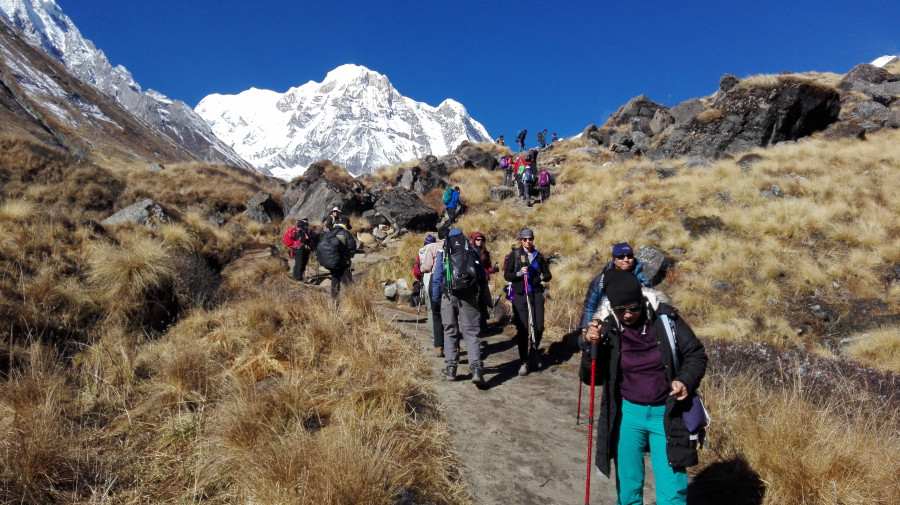Money
Luxury hotels in Kathmandu post record profits on higher arrivals
Some tourism entrepreneurs suspect that many hotels and resorts undervalue their incomes so that they can pay less taxes.
Sangam Prasain
Most hotels in the Kathmandu Valley posted record profits as of the third quarter on increased arrivals and occupancy, despite a sharp drop in average daily expenditure of tourists, Hotel Association Nepal said.
Among the three hotels listed on the Nepal Stock Exchange which have published their financial reports for the third quarter ending mid-April, Soaltee Hotel and Taragaon Regency Hotels generated runaway profits while Oriental Hotels saw a decline in profit due to an increase in expenses.
Soaltee Hotel said in its unaudited third-quarter report that its net profit soared 52.35 percent to Rs231 million. During the same period last year, its net profit was Rs151.64 million, the hotel said in its financial statement.
Soaltee earned revenues totalling Rs1.31 billion, up 16.61 percent year-on-year while its total expenses amounted to Rs1.02 billion, up 8.77 percent. The hotel said that it had been marketing aggressively to increase its occupancy in the fourth quarter in the key source markets. A rise in the price of electricity, fuel and industrial goods and labour tensions would be its domestic challenges and problem, Soaltee said.
Frequent announcements of strikes by the Netra Bikram Chand Biplab-led Communist Party of Nepal have become a big headache for the hospitality industry, travel trade entrepreneurs said.
Taragaon Regency Hotels’ third-quarter report shows its profit before bonus and tax jumped 29.47 percent compared to the same period in the last fiscal year. As per the unaudited financial statement published by the hotel, its net profit stood at Rs356.57 million in the third quarter of the current fiscal year. During the same period in the last fiscal year, its net profit was Rs275.40 million.
Taragaon’s revenues as of the third quarter increased 14.28 percent year-on-year to Rs1.04 billion. Revenues totalled Rs915.7 million during the same period in the last fiscal year. It’s paid-up capital stood at Rs1.88 billion including Rs777 million in reserves. The hotel said that its revenue swelled due to a rise in tourist arrivals and effective marketing strategy. It said that it may face competition in the coming days with the proliferation of five-star hotels in Nepal prompted by an improving political and business environment.
Oriental Hotels, which operates the five-star Radisson Hotel in Kathmandu, reported a net profit rise of 6.32 percent in the third quarter of the current fiscal year.
Oriental’s unaudited report for the third quarter shows a net profit of Rs207.45 million after tax, up from Rs195.11 million in the same period in the last fiscal year. Its revenue collection stood at Rs876 million. Oriental said that its profit growth slowed in the third quarter due to an increase in expenses as it had renovated 40 of its rooms. Its net profit was 9.15 percent in the same period last year.
The country has seen a large number of hotels being built, and it will be challenging if tourist arrivals do not match the development, Oriental Hotels said in its filing to the stock market.
Tourist arrivals crossed the coveted one-million mark for the first time in 2018, with 1.17 million foreign visitors streaming into the country, but their spending plummeted to a seven-year low. According to statistics from the Tourism Ministry, the average spending per tourist per day dropped to a seven-year low of $44. The average spending was $54 per day in 2017. In 2003, during the height of the Maoist insurgency, the per day spending of tourists hit a record $79.1.
Nepal received 1.17 million tourists last year and earned a record Rs70 billion in foreign exchange. The previous year, the country had welcomed 940,218 foreign visitors and earned Rs65.8 billion. This significant increase in visitors was not matched by a significant increase in income, leading economists and the tourism industry to wonder if Nepal was turning into a destination for budget travellers.
Binayak Shah, senior vice-president of Hotel Association Nepal, said that big hotels, particularly five-star properties, had been selling their rooms at good prices that resulted in record profit earnings this year. But an oversupply of rooms among hotels below the three-star rating forced them to slash tariffs, he said. “To survive in this competitive market, undercutting is obvious.”
Shah said that a large number of hotels had been selling their rooms at cheaper rates, and as a result, earnings had not increased despite arrivals crossing the one-million mark.
Some tourism entrepreneurs suspect that many hotels and resorts undervalue their incomes so that they can pay less taxes. The hospitality industry has reported a strong growth but incomes from tourism are decreasing, they said.
One tax official in Pokhara told the Post that the lake city had at least 700 hotels and restaurants doing good business, but tax payments were not proportional.
Nepal Rastra Bank officials have repeatedly warned the tourism industry in this regard, but the problem remains, according to tourism entrepreneurs.




 23.05°C Kathmandu
23.05°C Kathmandu














